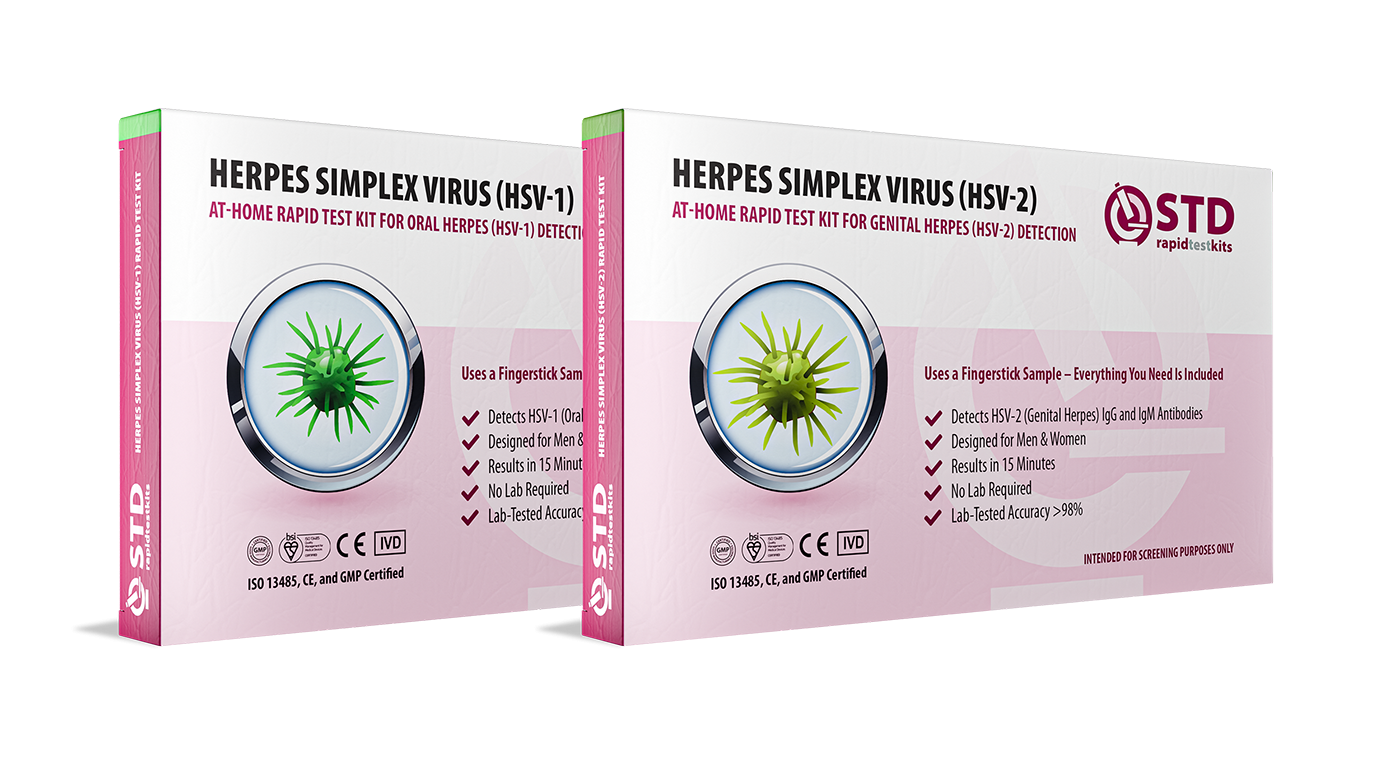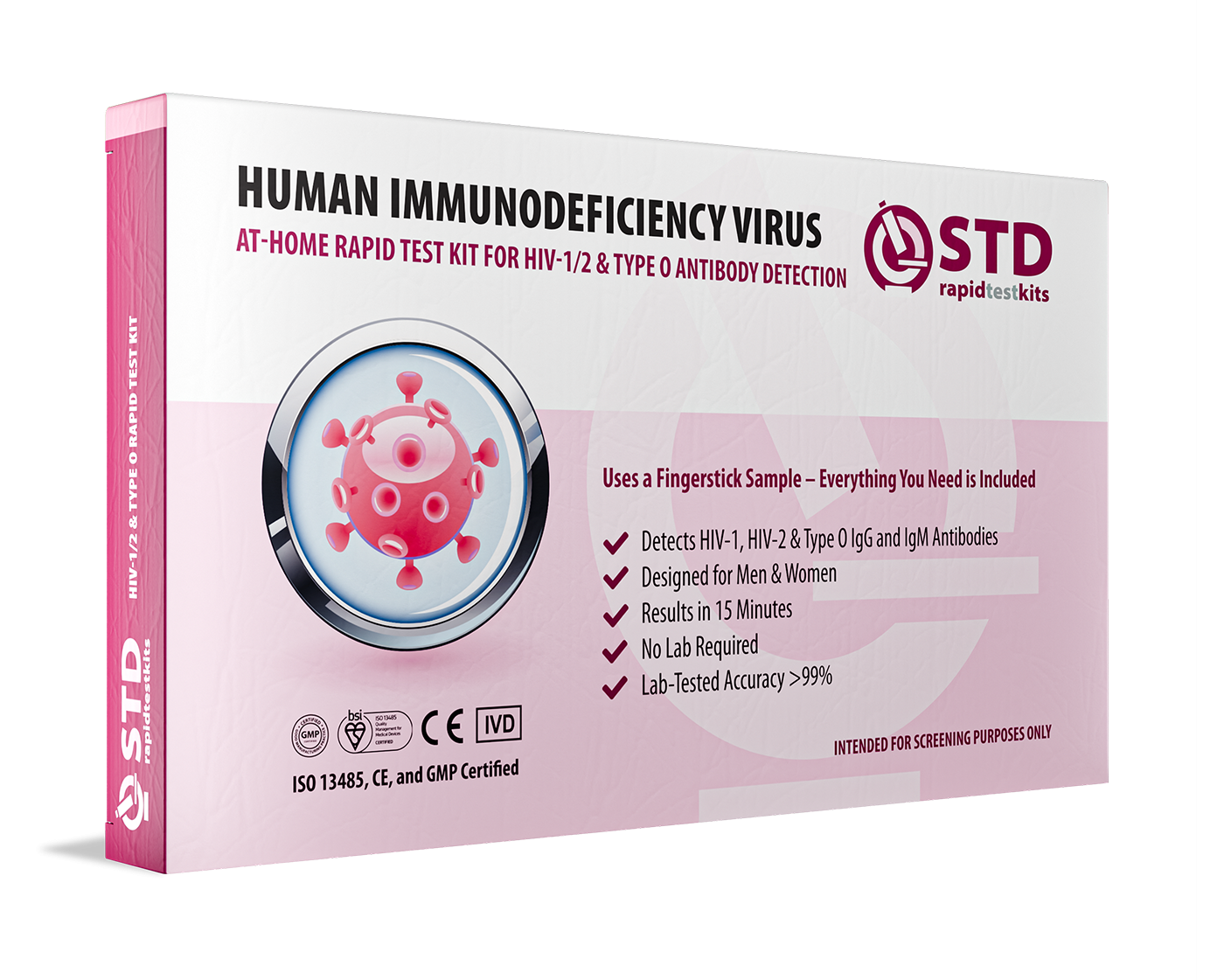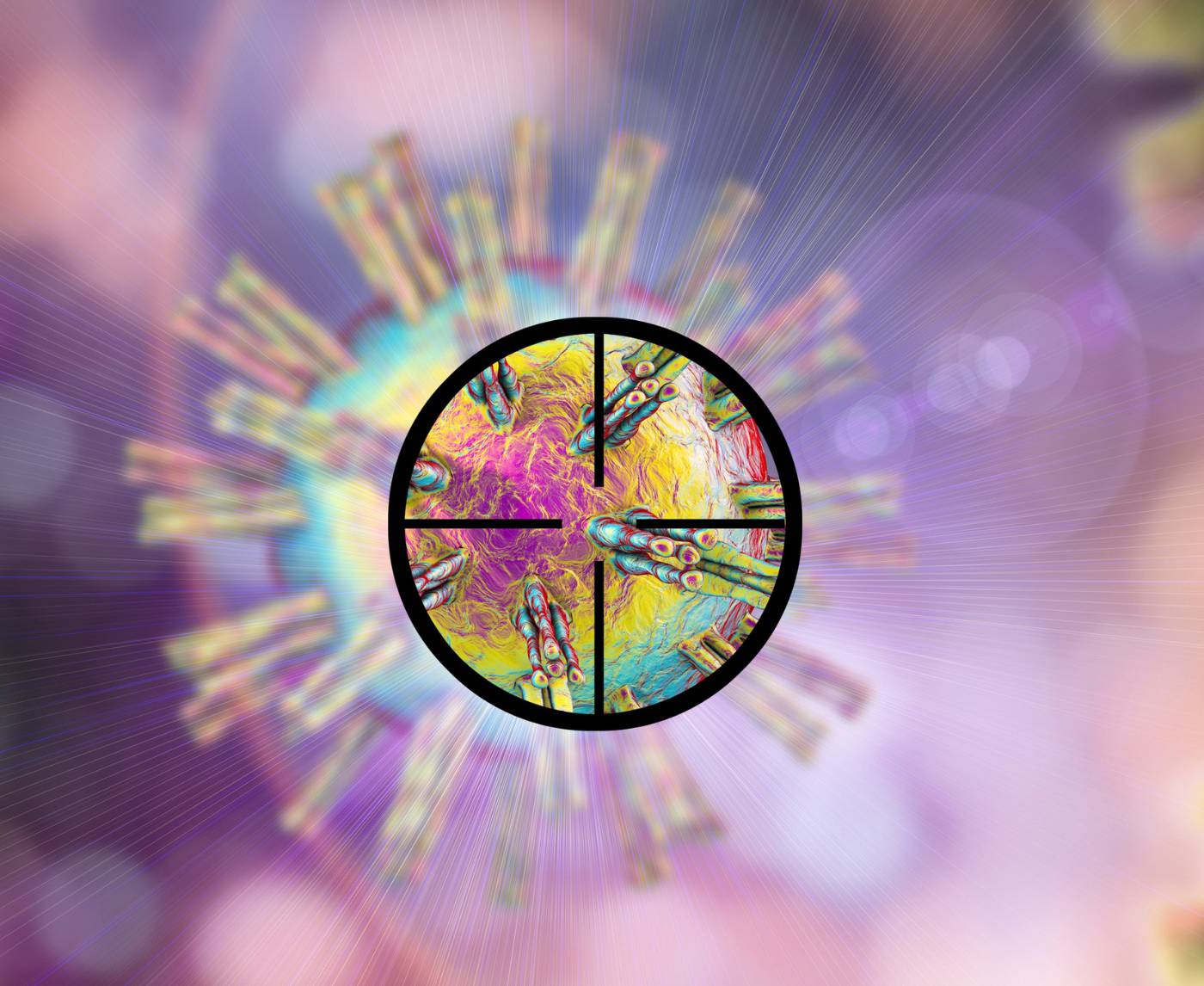The Growing Demand for Private STD Testing
Issue at Hand
Herpes and HIV are viral illnesses that have infected millions around the world. Herpes is caused by the herpes simplex virus, which produces inflammation and sores on the regions of the body where the virus manifests itself. HIV, on the other hand, is a long-term viral infection caused by an immune system response. While both illnesses present unique issues, there appears to be a link between them in that having herpes may raise the risk of transmitting another virus, specifically HIV.
So, why does herpes, if left untreated, increase HIV risk? Herpes-induced inflammation generates an environment in the body that facilitates HIV infection. Also, during herpes outbreaks, exposed sores and compromised mucosal barriers might allow HIV to enter the body more easily. All of these elements working together mean that being careful in herpes management is critical not only for keeping outbreaks under control, but also for minimizing the risk of HIV transmission.

Key Advantages of Treating Herpes
Treating herpes has evident benefits that go beyond minimizing outbreaks; it can also help protect against HIV. Here's why being proactive with herpes treatment is so important:
- Reduced Risk of Transmission: Treating herpes reduces inflammation and open sores, making it more difficult for HIV to enter the body.
- Improved General Health: Inflammation from herpes outbreaks weakens the immune system, making a person more susceptible to other illnesses. Treatment aids in the stability of the immune system.
- Quality of Life: With fewer outbreaks, you will be able to live peacefully without dread of the symptoms reoccurring again and again.
- Reducing the Risk of Spreading Herpes: Treating herpes lowers the risk of transmitting it to others, reducing the overall spread of HSV within a community.
- Reduced Stigma: Taking responsibility for your health may minimize the stigma associated with sexually transmitted illnesses.
In layman's words, herpes is manageable, and the benefits of treating the illness include lowering your risk of developing other serious conditions like HIV. HIV and herpes are one of several pairings of viral STDs.
Complications and Risks of Not Treating Herpes
The temptation may be great to ignore herpes if symptoms aren't that bad, but there are some serious dangers in doing so:
- Increased Risk of Transmitting HIV: Neglecting herpes exposes you to other viruses, especially in circumstances where HIV is a danger. Even if there are no symptoms, the presence of HSV in the body can increase HIV's capacity to spread.
- Increased Shedding: Herpes infection does not necessarily cause symptoms; one can shed the virus and spread it without even realizing it. This may be an example of unintended transmission.
- Risk of More Severe Outbreaks: If left untreated, eruptions may worsen over time, causing more pain and agony than is really required.
- Weakening Immune Defenses: Continuous herpes infections tax the immune system, potentially leading to difficulties when additional diseases, such as HIV, are introduced.
- Social and Emotional Consequences: Untreated herpes may cause social isolation, which can have a negative impact on relationships and general mental health.
Disregarding herpes therapy is not only detrimental to one's personal health, but it also promotes the spread of HSV and maybe HIV across the society.

Solutions and Recommendations
If you have herpes or are concerned about your HIV risk, here's how you can take action:
- Get Medical Advice: When you have questions about the sexually transmitted illness epidemic, consulting a healthcare expert is always a good idea. It helps to explain treatment alternatives and gives individualized guidance.
- Use At-Home Testing Kits: For individuals who value their privacy or prefer convenience, at-home STD test kits are a discrete but effective way to be informed about your sexual health.
- Check Your Health on a Regular Basis: While you may have had herpes for a long time, frequent health checks can help reduce the hazards associated with it.
- Know the Facts and Share Them: The risk of transmission decreases if you are knowledgeable about herpes and honest with your sexual partner.
- Maintain Your Immune System's Health: Through adequate nutrition, exercise, and stress management. This not only boosts your immune response, which helps decrease herpes reactivations, but it also protects you from other infections.
It is time to overcome the fear and stigma that has been holding you back from doing so. Herpes management is now easier than ever before, thanks to modern medicines and testing.
Check Your STD Status in Minutes
Test at Home with RemediumGenital & Oral Herpes Test Kit

 For Men & Women
For Men & Women Results in Minutes
Results in Minutes No Lab Needed
No Lab Needed Private & Discreet
Private & DiscreetOrder Now $75.00 $98.00
For all 2 tests
Statistical Insights and Data
- High Risk of HIV Transmission: According to multiple studies, people who have untreated herpes are 2-4 times more likely to develop HIV. This, too, provides a very compelling rationale for controlling the herpes infection.
- Herpes is a Co-Infection: Approximately 50-60% of HIV patients are infected with HSV-2, demonstrating the interrelationship between the two viruses.
- Cost-Effective Treatments: Antiviral therapy with acyclovir reduces HSV shedding by up to 80%, lowering the transmission rate by that much.
This strongly suggests that treating herpes is a beneficial step in the endeavor to reduce HIV risk.
Expert Opinions and Case Studies
Health practitioners around the world are calling for herpes management as part of STI management. Dr. Andrea Smith, an infectious disease specialist, says that "treating herpes early and consistently is one of the best ways to reduce not only outbreak frequency but also other infections like HIV." Case studies also discuss patients who improved their health and quality of life by following a herpes treatment plan, demonstrating how taking responsibility for one's health may have very substantial benefits.

History of the Disease
Herpes has traditionally been regarded as an irritation rather than a health issue. As our understanding of herpes' role in HIV transmission has improved, so has the medical community's attention on herpes management. Previously, treatments relied on symptomatic alleviation; however, antiviral medicines now make successful herpes management--and the reduction of co-infection with HIV--much more practicable.
Future Trends
New new trends aim on further lowering HSV transmission, and thus HIV risk, using behavioral interventions. Vaccines for herpes are being developed, and new medicines aimed at suppressing HSV could change prevention and therapy, providing more effective strategies to guard against HIV transmission. These could eliminate herpes for the affected individuals while also significantly lowering the global HIV infection rate.
Practical Applications
Here are some practical things that can be taken if you or someone you know has herpes:
- Antiviral Therapy Used Daily: This lowers the activity of HSV, lowering the risk of HIV.
- Practice Safe Sex: Barrier measures lower the risk of HSV and HIV.
- Early Detection from Comfort: Home testing is simple and private, allowing you to learn about your condition without having to visit a clinic.
These steps are reasonable but highly effective methods of reducing herpes' impact on HIV risk.
Industry Impact
Knowing the link between herpes and HIV, for example, has increased demand for frequent STI testing, treatment options, and education. Many clinics currently co-test individuals for HSV and HIV, particularly those from high-risk populations, as part of a larger attempt to minimize the latter's transmission rate.
Check Your STD Status in Minutes
Test at Home with RemediumHIV Rapid Test Kit

 For Men & Women
For Men & Women Results in Minutes
Results in Minutes No Lab Needed
No Lab Needed Private & Discreet
Private & DiscreetOrder Now $33.99 $49.00
Common Misconceptions
- "Herpes is not dangerous if the symptoms of the infection are not bothering me." Even asymptomatic herpes can raise HIV risk. As a result, even if the symptoms are minor, medication is still beneficial.
- "Only people who have many sexual partners get herpes." Anyone can have herpes, and having sex with only one partner can readily transmit the infection.
- "Treatment does not help for herpes." Antiviral treatment can significantly minimize outbreaks while also minimizing the danger of transmission.
- "Herpes won't affect my risk for HIV." The presence of herpes, if not treated, increases the body's susceptibility to HIV.
- "Only genital herpes enhances HIV risk." Oral herpes can also enhance one's vulnerability to HIV, thus it must be treated holistically.

Frequently Asked Questions
1.- Can herpes treatment lessen my risk of contracting HIV?
Yes, herpes symptoms can be treated with antiviral medicine, which reduces inflammation and viral shedding, therefore lowering a person's risk of contracting HIV.
2.- How does an at-home STD test work?
These at-home STD tests were created with privacy and convenience in mind. Simply gather your sample, submit it to our lab, and you will receive your results safely.
3.- Is herpes manageable in the long run?
Absolutely, as long as treatment is provided on a regular basis, outbreaks can be controlled and transmission risks are considerably reduced.
4.- Does having herpes guarantee that I will get HIV?
No, having herpes does not imply you will contract HIV. But you must be proactive. If herpes is not treated, it can increase your risk of transferring HIV.
5.- Can herpes be prevented from being transmitted?
Yes, numerous techniques reduce the chances, including barrier methods, testing, and antiviral treatment.
6.- Why does untreated herpes raise one's HIV risk?
Untreated herpes can result in open sores and inflammation, providing several entrance points for HIV and further weakening the immune system.
7.- What exactly are the symptoms?
The symptoms include painful sores, itching, and flu-like symptoms. In some cases, there are no symptoms, yet the infection is still present.
8.- Can I use home testing for both herpes and HIV?
Yes, many at-home testing kits can detect various STDs, including herpes and HIV, providing a discreet approach to monitor your health.
9.- How soon should I seek treatment for herpes?
It's better to get therapy as soon as you're diagnosed. Early treatment can help to prevent outbreaks, reduce transmission risk, and protect against consequences.
10.- Is herpes more hazardous if you have HIV?
Yes, herpes is more severe in HIV-positive people due to their compromised immune systems. It is so critical to effectively manage both infections with appropriate medication. For this, appropriate medical intervention is required.
Take Care of Your Health & Get Tested Today
Herpes is normally controllable, but it should not be underestimated. Learning about how the virus interacts with HIV allows us to take proper precautions to protect our health. Neglecting herpes treatment is simply too risky when safe, convenient choices, such as our at-home STD test kits, make it easier than ever to stay educated and proactive. Don't leave your health to chance; take charge today with dependable, discrete testing that provides peace of mind.
References
1.- Why Genital Herpes Boosts Risk of HIV Infection - NIH
2.- HSV-2 Infection as a Risk Factor for HIV Acquisition: A Meta-Analysis - PubMed
3.- HIV Acquisition Increased by Genital Herpes Co-Infection - BMC Infectious Diseases
4.- The Role of HSV-2 in HIV-1 Transmission - Clinical Infectious Diseases










